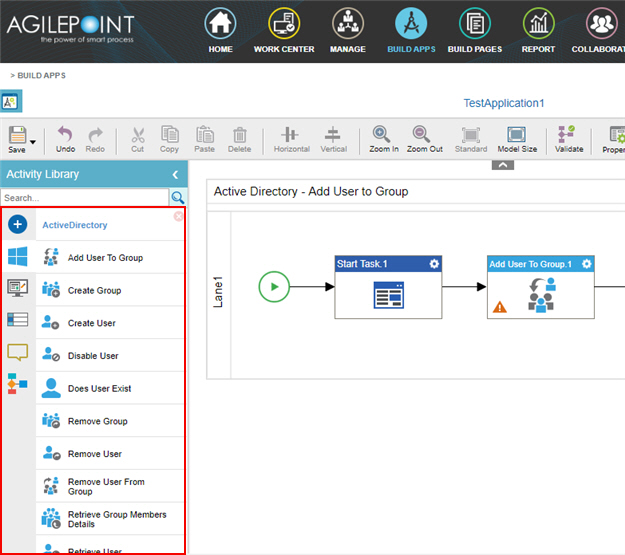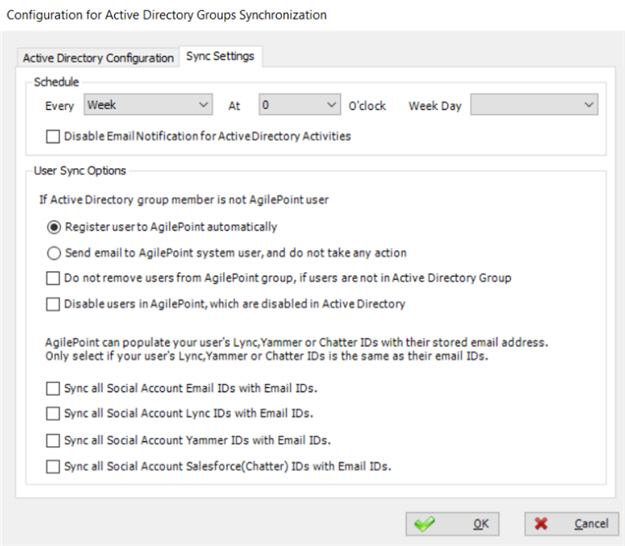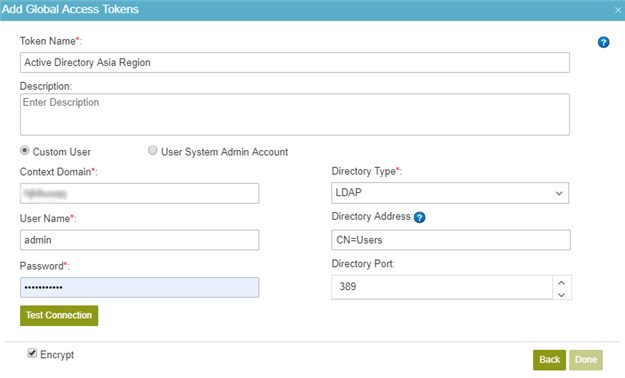Active Directory
Active Directory is a Microsoft software system that stores information about organizations, people, and computer networks in a hierarchical format with LDAP.
Integrations and Connectors
AgilePoint NX integrates in these ways with Active Directory:
- Activities in Process Builder
- Active Directory Synchronization
- Access tokens
Activities in Process Builder
You can use out-of-the-box activities for Active Directory to execute actions in process-based apps.
An activity is a functional unit, or task, in a process-based app. Activities that integrate with a third-party system provide access to the API functionality for that system in a simple, point-and-click, form-entry format. This means that you can easily leverage APIs without writing code.

The following activities are available for Windows Azure Active Directory:
- Add Users To Group
- Create Group
- Create User
- Disable User
- Does User Exist
- Remove Group
- Remove User
- Remove User From Group
- Retrieve Group Members Details
- Retrieve User
- Update User
For more information, refer to the process activities for Active Directory in Process Builder.
Active Directory Synchronization
If your organization uses Active Directory to manage users and groups, you can use Active Directory synchronization (sometimes called AdSync) to synchronize your Active Directory users and groups with AgilePoint NX users and groups. Active Directory synchronization lets you add, change, and delete users and groups in Active Directory, and those changes are automatically reflected in AgilePoint NX.
For more information, refer to How Do I Use Active Directory with AgilePoint NX?.

Access Tokens
You can create access tokens for Active Directory.
An access token is a secure object that stores an endpoint (usually a URL) and authentication credentials to connect to a service or technology. Often this is an external or third-party service, like Salesforce or SharePoint, but access tokens can also connect to an AgilePoint NX enviornment, local database, or other types of technologies. Once an access token is created, application designers can simply select and reuse it, rather than entering the credentials each time they are needed.
For more information, refer to Access tokens for Active Directory.

Related Topics
Examples
Some information about third-party integrations is outside the scope of the AgilePoint NX Product Documentation, and it is the responsibility of the vendors who create and maintain these technologies to provide this information. This includes specific business uses cases and examples; explanations for third-party concepts; details about the data models and input and output data formats for third-party technologies; and various types of IDs, URL patterns, connection string formats, and other technical information that is specific to the third-party technologies. For more information, refer to Where Can I Find Information and Examples for Third-Party Integrations?
Active Directory Documentation
Use these links to find third-party vendor documentation for Active Directory:
About This Page
This page is a navigational feature that can help you find the most important information about this topic from one location. It centralizes access to information about the concept that may be found in different parts of the documentation, provides any videos that may be available for this topic, and facilitates search using synonyms or related terms. Use the links on this page to find the information that is the most relevant to your needs.
Keywords
Active Directory, AdSync, AD, user store, user database, LDAP, Microsoft, MS


